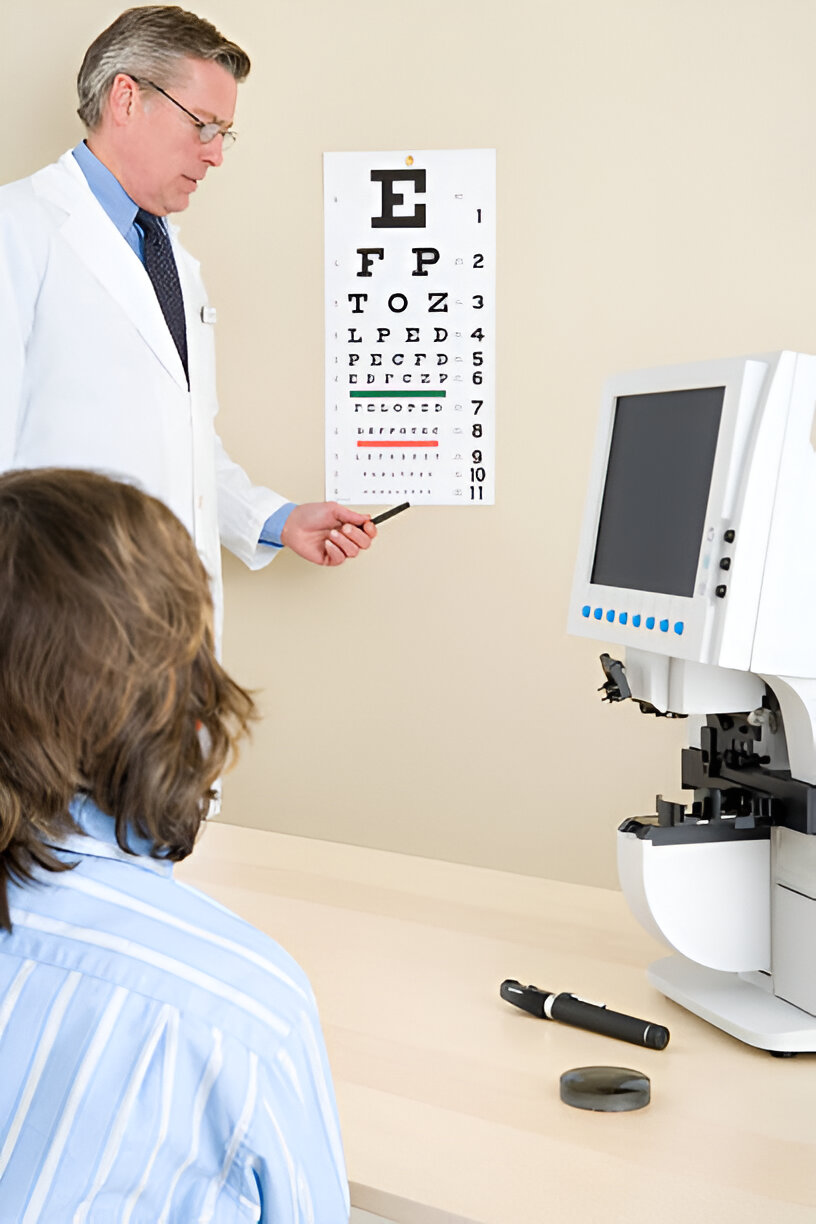Can an Eye Exam Detect Diabetes? What You Need to Know
Diabetes can affect many parts of the body, including your eyes. One question that often comes up is, “Can an eye exam detect diabetes?” The short answer is yes. Regular eye exams play a critical role in detecting early signs of diabetes, particularly through the identification of diabetic retinopathy, a condition caused by diabetes that can lead to serious vision problems. This article will explore how an eye exam can help detect diabetes, what signs your eye doctor may look for, and why it’s important to keep up with routine eye care.
How Can an Eye Exam Detect Diabetes?
During a comprehensive eye exam, your eye doctor looks for various signs of health issues that could affect your vision. One of the most significant conditions eye doctors can detect is diabetes. Diabetes affects the blood vessels in your eyes, specifically those in the retina, which is the light-sensitive tissue at the back of the eye. High blood sugar levels can damage these blood vessels, leading to diabetic retinopathy, the most common diabetic eye disease.
A dilated eye exam allows your eye doctor to get a closer look at the back of your eye. By using eye drops to dilate the pupils, the doctor can examine the retina and detect signs of diabetes. In some cases, the doctor may also use advanced imaging techniques to get a more detailed view of the blood vessels in your eyes.
Diabetic Retinopathy: The Connection Between Diabetes and Eye Health
Diabetic retinopathy is a leading cause of vision loss among people with diabetes. This condition occurs when high blood sugar levels damage the blood vessels in the retina. Over time, this damage can lead to bleeding, swelling, and even detachment of the retina, which can result in vision loss or blindness if left untreated.
The early stages of diabetic retinopathy may not cause noticeable symptoms, but an eye exam can detect signs of damage before they affect your vision. That’s why it’s crucial for people with diabetes to get regular eye exams. By detecting diabetic retinopathy early, your eye doctor can recommend treatments to help manage the condition and protect your eyesight.
The Role of Regular Eye Exams in Diabetes Management
For people with diabetes, regular eye exams are a key part of diabetes management. The American Diabetes Association recommends that anyone diagnosed with diabetes should get a comprehensive eye exam at least once a year. This helps detect early signs of diabetic eye diseases, which can develop without symptoms in the initial stages.
Eye exams can help detect diabetes-related eye conditions early, allowing for timely treatment. Regular eye examinations are especially important for people with type 1 or type 2 diabetes, as both forms of the disease can lead to eye problems over time.
What to Expect During an Eye Exam for Diabetic Retinopathy
During an eye exam, your eye doctor will look for signs of diabetic eye disease, including diabetic retinopathy. The exam typically begins with a visual acuity test to check your eyesight, followed by a dilated eye exam. The doctor will use eye drops to dilate your pupils, allowing for a closer look at the back of your eye.
Your eye doctor may also perform additional tests, such as optical coherence tomography (OCT), to capture detailed images of the retina. This test helps the doctor detect early signs of diabetic retinopathy, such as swelling or fluid buildup in the retina.
In some cases, your eye doctor may recommend more frequent eye exams if you are at higher risk of developing diabetic eye disease. People with uncontrolled blood sugar levels or a history of diabetic retinopathy may need more frequent monitoring to protect their vision.
How Diabetes Can Affect Your Eyes
Diabetes can affect your eyes in several ways, leading to conditions that may harm your vision. In addition to diabetic retinopathy, people with diabetes are more likely to develop other eye conditions, including:
- Cataracts: Diabetes can cause cataracts to form at an earlier age. A cataract is a clouding of the lens in your eye, which can blur your vision.
- Glaucoma: People with diabetes are at a higher risk of developing glaucoma, a group of eye diseases that damage the optic nerve and can lead to vision loss.
- Diabetic Macular Edema: This condition occurs when fluid builds up in the macula, the part of the retina responsible for central vision. It can cause blurred vision and is a common complication of diabetic retinopathy.
By getting regular eye exams, people with diabetes can reduce the risk of developing these eye conditions and protect their overall eye health.
Why Routine Eye Exams Are Crucial
Routine eye exams are crucial for anyone with diabetes. These exams help detect diabetes-related eye conditions before they progress to more severe stages. Early detection through a comprehensive eye exam can make a significant difference in managing diabetic eye diseases and maintaining good vision.
Diabetes can put your eyes at risk, but regular eye care can help minimize the damage. Eye exams are important not only for detecting diabetic eye disease but also for monitoring overall eye health. By staying on top of your eye care routine, you can reduce the risk of vision loss and protect your eyesight for the long term.

What Your Eye Doctor May Tell You After an Eye Exam
After your eye exam, your eye doctor may discuss the findings with you. If the doctor detects signs of diabetic retinopathy or other eye conditions related to diabetes, they will recommend a treatment plan to help manage the condition. This may include lifestyle changes, medications, or in some cases, surgery to prevent further damage to your eyes.
Your eye doctor may also advise you to continue with regular eye exams and diabetes management to protect your vision. Keeping your blood sugar levels under control is essential for preventing further damage to the blood vessels in your eyes.
Get Your Next Eye Exam at Providence Eye Associates
An eye exam can detect early signs of diabetes and other health conditions that affect your eyes. Regular eye exams are a crucial part of diabetes management, helping detect diabetic retinopathy and other eye diseases before they progress. If you have diabetes, make sure to schedule your next eye exam with Providence Eye Associates.
Our team of experienced eye doctors is dedicated to providing comprehensive eye care for people with diabetes. We’ll work with you to monitor your eye health and develop a personalized plan to protect your vision. Contact us today to schedule your next eye exam.
Dr. Greg S. Levin
Owner at Providence Eye Associates
Providence Eye Associates offers comprehensive eye care services, including pediatric eye exams, eyeglasses, and more, all aimed at supporting your child’s eye health and academic success. To learn more or to schedule an appointment, visit our website or contact us directly.

